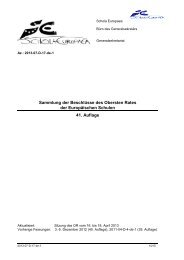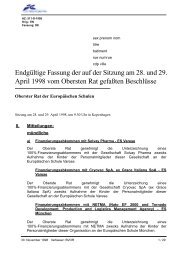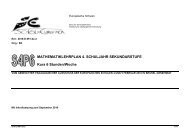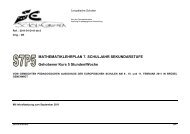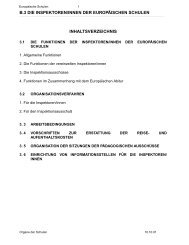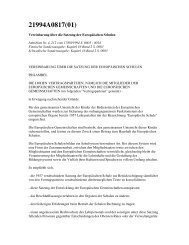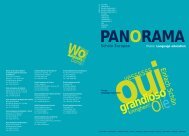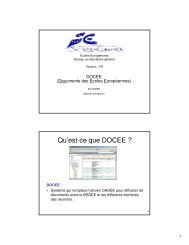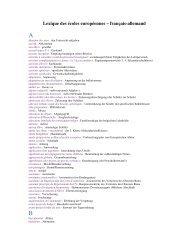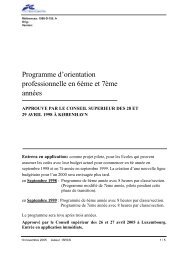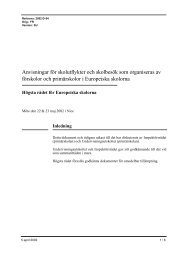External Evaluation of the European Baccalaureate (Annexes)
External Evaluation of the European Baccalaureate (Annexes)
External Evaluation of the European Baccalaureate (Annexes)
Create successful ePaper yourself
Turn your PDF publications into a flip-book with our unique Google optimized e-Paper software.
Class examinations, at <strong>the</strong> end <strong>of</strong> <strong>the</strong> first semester, if studying advanced maths, <strong>the</strong>re will be a class<br />
examination at <strong>the</strong> end <strong>of</strong> each semester and an arithmetical average <strong>of</strong> all scores will give <strong>the</strong> B mark<br />
Total marks available 25 out <strong>of</strong> 40 marks<br />
As before, <strong>the</strong> Oral exam is optional at <strong>the</strong> higher level EB<br />
Oral Examination<br />
Advanced maths requires an oral examination. These last 20 minutes and students are required to draw<br />
by lot an envelope containing a number. They will <strong>the</strong>n get a question corresponding to that number.<br />
Students may reject <strong>the</strong> first question picked, but will automatically lose 20 % <strong>of</strong> <strong>the</strong> marks awarded for <strong>the</strong><br />
second question chosen. Some preparation time is given and note may be taken. The student <strong>the</strong>n has to<br />
set out his/her ideas on how to solve <strong>the</strong> problem. If <strong>the</strong> student is incapable <strong>of</strong> taking <strong>the</strong> initiative <strong>the</strong><br />
examiner make ask questions to start/form a dialogue. Two examiners are used, one is <strong>the</strong> class teacher<br />
and <strong>the</strong> average score from <strong>the</strong> two examiners determines <strong>the</strong> final mark. Examiners mark out <strong>of</strong> 10 as a<br />
raw score.<br />
Total marks available 24 marks out <strong>of</strong> 100<br />
Marking is done by two examiners. The class teacher marks first <strong>the</strong>n an external examiner marks <strong>the</strong><br />
paper. If <strong>the</strong>re is a difference <strong>of</strong> more than 3 marks, a third examiner is called in to mark.<br />
Criteria for success<br />
A final mark <strong>of</strong> 60% or more will indicate a pass<br />
Students scoring at least 57% and less than 60 % will have <strong>the</strong>ir results reviewed and if <strong>the</strong>y have<br />
achieved 6/10 in three <strong>of</strong> <strong>the</strong> five written exams may be awarded a pass.<br />
Students scoring 59 to 59.99% must have obtained a satisfactory result in two <strong>of</strong> <strong>the</strong> five exams to be<br />
awarded a pass.<br />
There are obvious contrasts between <strong>the</strong> two qualifications. OCR GCE is an exam only qualification,<br />
whereas <strong>the</strong> EB has <strong>the</strong> class work element. The EB is examined at <strong>the</strong> end <strong>of</strong> <strong>the</strong> two-year course and<br />
predominantly on <strong>the</strong> year 7 syllabus. The GCE is split into two sections, with a formal qualification<br />
available at <strong>the</strong> end <strong>of</strong> <strong>the</strong> first year <strong>of</strong> advanced study made up <strong>of</strong> three modules. The EB is a pass/fail<br />
qualification. The OCR GCE allows re-sits <strong>of</strong> each module to improve scores. The EB diploma requires<br />
students to be secure in all aspects <strong>of</strong> <strong>the</strong> syllabus and has penalties built in, should students pick a<br />
question for <strong>the</strong> oral exam which may not play to <strong>the</strong>ir strengths. The choice <strong>of</strong> a second question invokes<br />
a penalty <strong>of</strong> 20%. The OCR GCE allows students to study more than one option and <strong>the</strong>n choose <strong>the</strong> one<br />
that achieves <strong>the</strong> highest score, to be aggregated into <strong>the</strong> final grade for <strong>the</strong> A level.<br />
Comparison <strong>of</strong> Marking Procedures<br />
It is not possible to compare <strong>the</strong> three qualifications in terms <strong>of</strong> expectations, marking procedures. There<br />
are no IB scripts to use to assess. Looking at The EB and GCE scripts, <strong>the</strong>re is little common material<br />
available to compare objectively, between <strong>the</strong> two. There are differences in <strong>the</strong> make up <strong>of</strong> <strong>the</strong> papers, <strong>the</strong><br />
GCE paper is a series <strong>of</strong> short questions, <strong>the</strong> EB has short questions from each <strong>of</strong> <strong>the</strong> main headings,<br />
<strong>the</strong>n <strong>the</strong> optional long questions. The GCE has no optional questions and no long questions.<br />
In terms <strong>of</strong> <strong>the</strong> examiners role, <strong>the</strong> EB diploma has teacher involvement, GCE does not. The EB has a<br />
very rigorous checking system to ensure accuracy in marking <strong>of</strong> every script; <strong>the</strong> GCE has moderators<br />
checking samples <strong>of</strong> work to ensure consistency. The IB uses external examiners and no individual<br />
feedback is available for students, only an examiners report that highlights strengths and weaknesses <strong>of</strong><br />
all candidates sitting <strong>the</strong> HL exams.<br />
59



